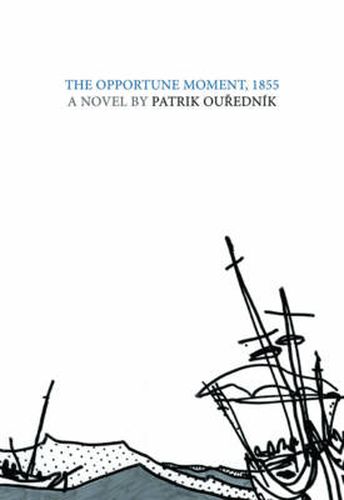Readings Newsletter
Become a Readings Member to make your shopping experience even easier.
Sign in or sign up for free!
You’re not far away from qualifying for FREE standard shipping within Australia
You’ve qualified for FREE standard shipping within Australia
The cart is loading…






A Voltairean attack on the political idealism that gave birth to the modern world.
$9.00 standard shipping within Australia
FREE standard shipping within Australia for orders over $100.00
Express & International shipping calculated at checkout
A Voltairean attack on the political idealism that gave birth to the modern world.
Czech author Patrick Ourednik’s newly translated novella, The Opportune Moment, 1855, tells the story of a group of expatriate Europeans attempting to start an anarchist commune, called the Fraternitas Free Settlement, in Brazil. But from the very outset, the reader knows that the settlement is doomed; the novel opens with a letter, dated March 1902, written by the leader of this anarchist collective – a man affectionately referred to by his followers as ‘Older Brother’. While the letter is meant to serve as a sort of apologia pro sua vita, Older Brother’s self-important and grandiloquent expression of his lofty ideals spills over into comic pastiche, and his laments about the failure of the commune emphasise his own unwillingness to take any responsibility for its collapse. While he bemoans various problems with his plan’s execution – particularly his poor choice of volunteers for the first wave of settlers – he refuses to admit any error and stands by his principles.
But while Ourednik’s opening makes it clear that the colony has failed, the actual events leading up to its failure remain mysterious. Indeed, after the end of this brief letter, the narrative jumps back in time to 1855 in the form of a ship’s diary kept by one of the future settlers currently voyaging to Brazil. The narrator’s naïve hopes for his future life in the commune – a life in which there will be free love, voluntary work, no hierarchical structures and communal sharing of wealth – are already undermined by the quarrelling occurring onboard the ship. The passengers have already factionalised, and are separated by their nationalities (French, Italian, German) and their political beliefs (the anarchists, the communists, and the independents). While Ourednik successfully both conveys this disjuncture and exploits its comedic potential, at this point in the novel, it appears that the book is a clever, if unoriginal, elaboration of a familiar story: an impassioned but naïve group of political radicals attempts to change the world, but falls miserably short with tragic results.
But the novel’s final act underwrites the seemingly simple narrative that the first two sections develop. Taking place in the new settlement itself, the narrative formally mimics the unfolding anarchy of the colony; while it becomes clear that the settlement is increasingly moving down a dangerous and possibly even violent path, separating out events becomes more and more difficult, and both narrative and historical hierarchies begin to deteriorate – with an ending that throws everything that came before into serious doubt. The result is a brilliant meditation on the link between political agency and the way that history is recorded and written down.
Ourednik (who has lived in France for almost three decades) is regarded as one of the most important living Czech authors. Although he’s best known in the English-speaking world for his novel Europeana: A Brief History of the Twentieth Century, which, as the title suggests, compresses 100 years of European history into 120 absurd and funny pages, The Opportune Moment, 1855 is another brilliant effort from this essential European satirist.
Emmett Stinson is the author of